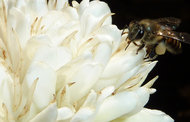Apparently humans and honeybees share something in common when it comes to caffeine. Dr. Geraldine Wright (Newcastle University, England) discovered that bees are more likely to return to flowers that produce nectar containing caffeine. Their data suggest caffeine improves memory in bees. Caffeine is present in higher concentrations in the leaves and other tissues of the plant where it provides the added benefit of warding off predators.
According to a quote from The New York Times by Dr. Robert a Raguso at Cornell University, “It makes the reader think twice about where natural products that have economic importance to humans actually came from before we ‘discovered’ and co-opted their biology.”
Dr. Wright is studying the honeybees as models for drug abuse in humans.
It is fascinating that the neurochemistry of caffeine is so similar between humans and insects. Starbucks has the same effect on me...keeps me coming back for more.
Sources:
Wright GA, Baker DD, Palmer MJ, Stabler D, Mustard JA, Power EF, Borland AM, Stevenson PC. Caffeine in floral nectar enhances a pollinator's memory of reward. Science. 339: 1202-1204. DOI: 10.1126/science.
The New York Times


Coffee! Like caffeine to a bee.
Interesting article! Their data suggest caffeine improves memory in bees; but from a behavioural perspective would the bees be returning to the flower because it produced the most reinforcement? Hmmmm...
Thanks for sharing!
This article is very interesting because I have been drinking coffee since 7th grade and cannot miss a day. I know I experience these feelings of always coming back for more but find it fascinating that bees experience the same effect. According to this article (http://www.webmd.com/balance/caffeine-myths-and-facts) caffeine has some negative side effects when stopping caffeine intake abruptly. It can cause headache, fatigue, anxiety, and irritability. I have certainly had these side effects if I don't have my coffee in the morning. I wonder if bees experience the same effects when they don't get their caffeine.
Do bees get the same side effects as humans?
Great article. @Sarah It is incredible the amount of dimensions that consumption of caffeine can have, especially when we talk about human cognition. I also found a very interesting entry about such effects. Thank you!.
(http://psicologiayneurocienciaenespanol.blogspot.com/2013/04/mas-cafein…)